How to Engage Introverts: 15 Practical Workplace Tips
Introverts bring depth, focus, and creativity to the workplace—but engaging them requires a different approach. In this blog, explore 15 proven ways to support, recognize, and empower introverts using thoughtful strategies and tools like Empuls.
On this page
They may not be the loudest voice in the room, but introverts often carry the deepest thoughts. In a world that celebrates extroversion—open floor plans, team brainstorming sessions, and virtual happy hours—it's easy to overlook those who thrive in quieter corners. But when it comes to building truly inclusive and high-performing teams, learning how to engage an introvert isn’t optional—it’s essential.
How to engage introverts isn’t just about coaxing them into speaking up; it’s about creating a culture where they want to. Where thoughtful contributions are valued just as much as fast talk. Where solitude is respected, and quiet confidence is recognized.
This blog is your guide to tapping into the untapped—those introspective minds that bring depth, focus, and innovation to your workplace.
Let’s begin.
How to engage and help introverts in remote teams?
Here are the ten ways to engage introverts in your team:
1. Create space for asynchronous communication
Introverts often prefer time to process information before sharing their thoughts. Traditional meetings, especially ones that demand quick brainstorming or immediate verbal feedback, can put them at a disadvantage. To truly engage introverts, foster a culture that embraces asynchronous communication.
Encourage team members to share ideas and feedback through emails, shared documents, or collaboration tools like Empuls' social intranet or Slack.
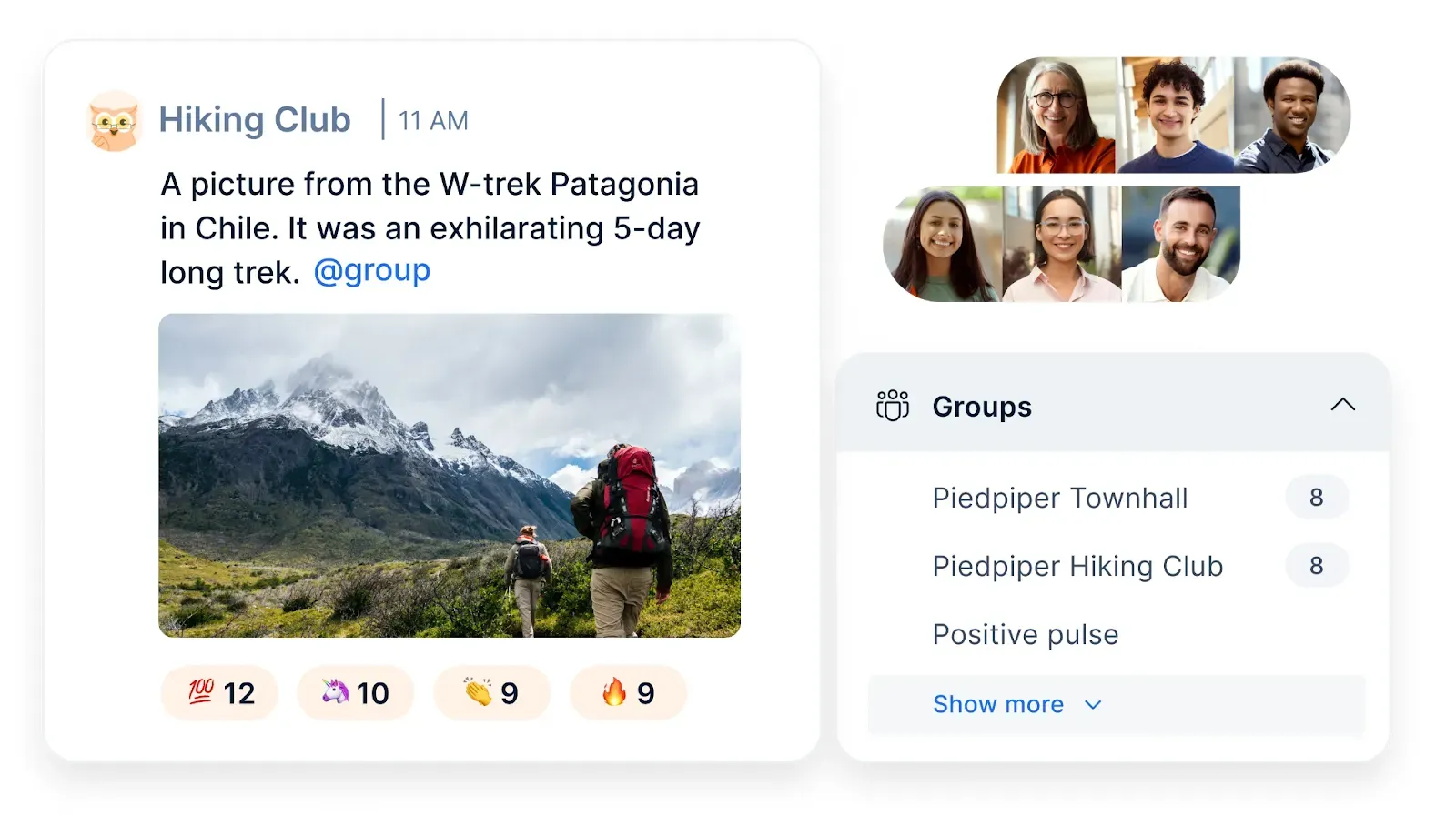
Asynchronous channels allow introverts to reflect deeply, articulate their thoughts clearly, and contribute meaningfully without the pressure of speaking in real time. This not only empowers them but also leads to better quality input.
Over time, you’ll notice improved participation, enhanced idea generation, and a more inclusive communication style that respects every personality type in your organization.
2. Recognize quiet wins publicly
Introverts may not seek the spotlight, but they sincerely value meaningful recognition—especially when it’s authentic and acknowledges their work ethic or behind-the-scenes contributions.
Platforms like Empuls allow managers to recognize employees in a visible way to the team yet not overwhelming. Using Empuls' recognition feed, managers can highlight an introvert’s achievement—completing a critical project, supporting a teammate, or simply showing consistent excellence.
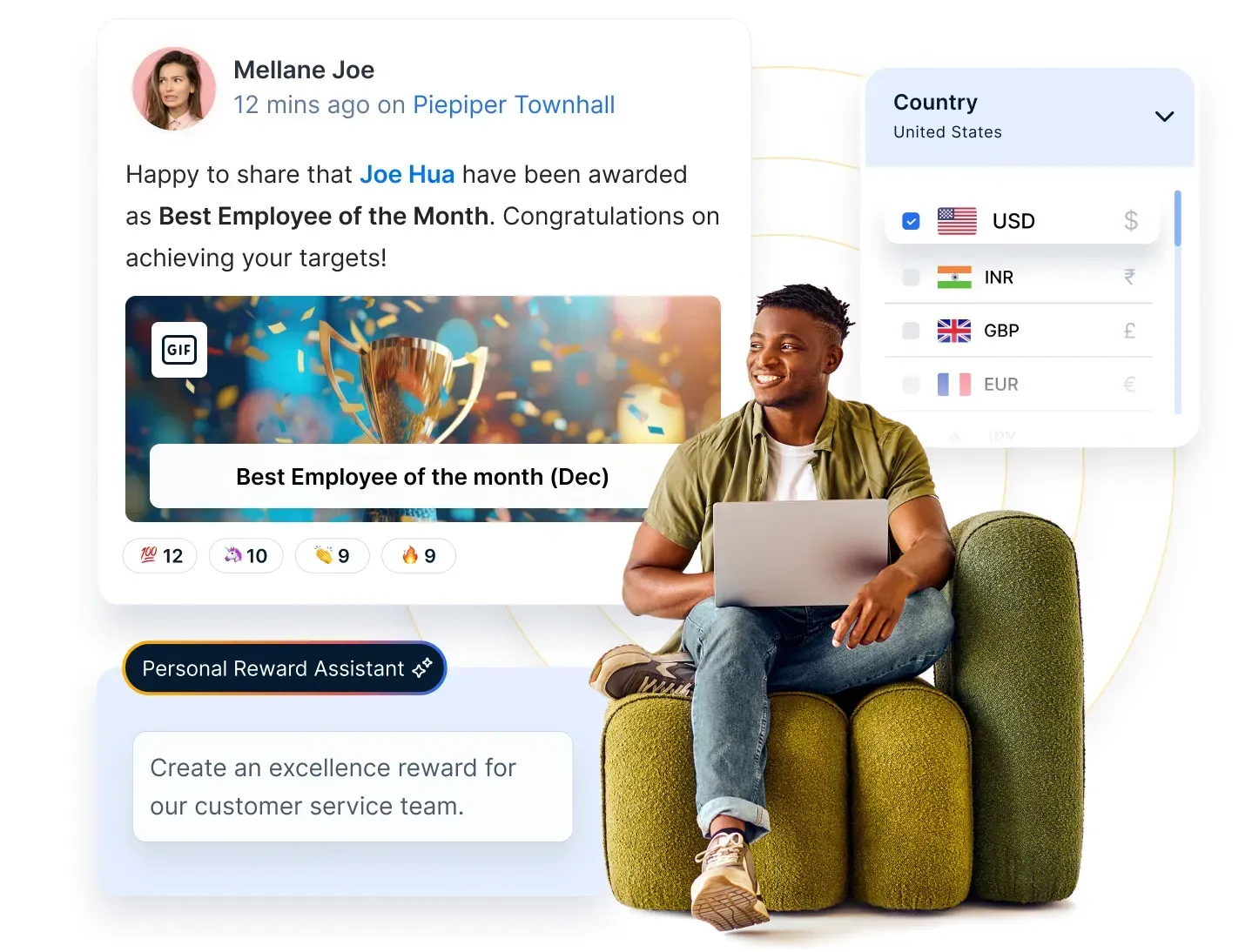
When delivered respectfully and without theatrics, this public praise makes introverts feel valued without putting them on the spot.
Moreover, Empuls lets peers send appreciation through badges and thank-you notes, fostering a culture of gratitude and peer-to-peer motivation. Recognizing introverts in this thoughtful, structured way boosts morale and encourages sustained engagement.
3. Offer one-on-one feedback opportunities
Introverts often thrive in one-on-one settings where they feel safe, heard, and respected. Large meetings or performance discussions with multiple participants may prevent them from opening up or sharing concerns.
Schedule regular one-on-one sessions between employees and their managers to engage introverts meaningfully. These should be intentional, structured conversations where introverts can express ideas, share challenges, and receive feedback in a non-intimidating environment.
Use these meetings for performance reviews and to ask about their goals, work preferences, and well-being.
Over time, these private check-ins can help build trust, surface insights that may not be shared in group settings, and improve employee-manager relationships. The key is consistency and genuine interest—not just ticking a box.
4. Build interest-based communities
Introverts may not gravitate toward watercooler chats or company-wide social events but value meaningful connections—especially around shared interests. Creating interest-based community groups is a great way to engage them in a low-pressure, authentic way.
On Empuls, organizations can set up hobby groups, wellness communities, book clubs, or even niche project-based groups where introverts can participate on their terms. These groups allow introverts to bond over shared interests, collaborate creatively, and feel a part of something bigger without needing constant socializing.
The platform supports these groups' content sharing, discussions, and digital celebrations. This community-driven approach improves belonging helps surface hidden talents, and organically builds cross-functional camaraderie.
5. Encourage written brainstorming sessions
Introverts tend to be deep thinkers. In fast-paced brainstorming sessions, they may hold back—not because they lack ideas, but because they prefer to process and reflect before responding. One powerful strategy to engage introverts is to shift brainstorming to a written-first format.
Before a team ideation meeting, send out prompts or questions and allow team members to submit their thoughts asynchronously via shared docs, Empuls polls, or internal forums.
During the meeting, these written inputs can form the foundation for discussion, giving introverts the recognition and credit they deserve for their ideas. This method encourages participation from all personality types and leads to better-prepared and more thought-through outputs.
6. Create a culture of respect for all communication styles
A truly inclusive culture acknowledges that not everyone communicates the same way. While extroverts may process out loud and thrive in spontaneous discussions, introverts often prefer reflection and structured sharing.
Use Empuls' rich communication formats—like posts, polls, quizzes, and social forums—to enable everyone to contribute in their own style. Create channels for written feedback, idea submissions, and asynchronous Q&A during town halls. Make space in meetings for “silent brainstorming” or written follow-ups.
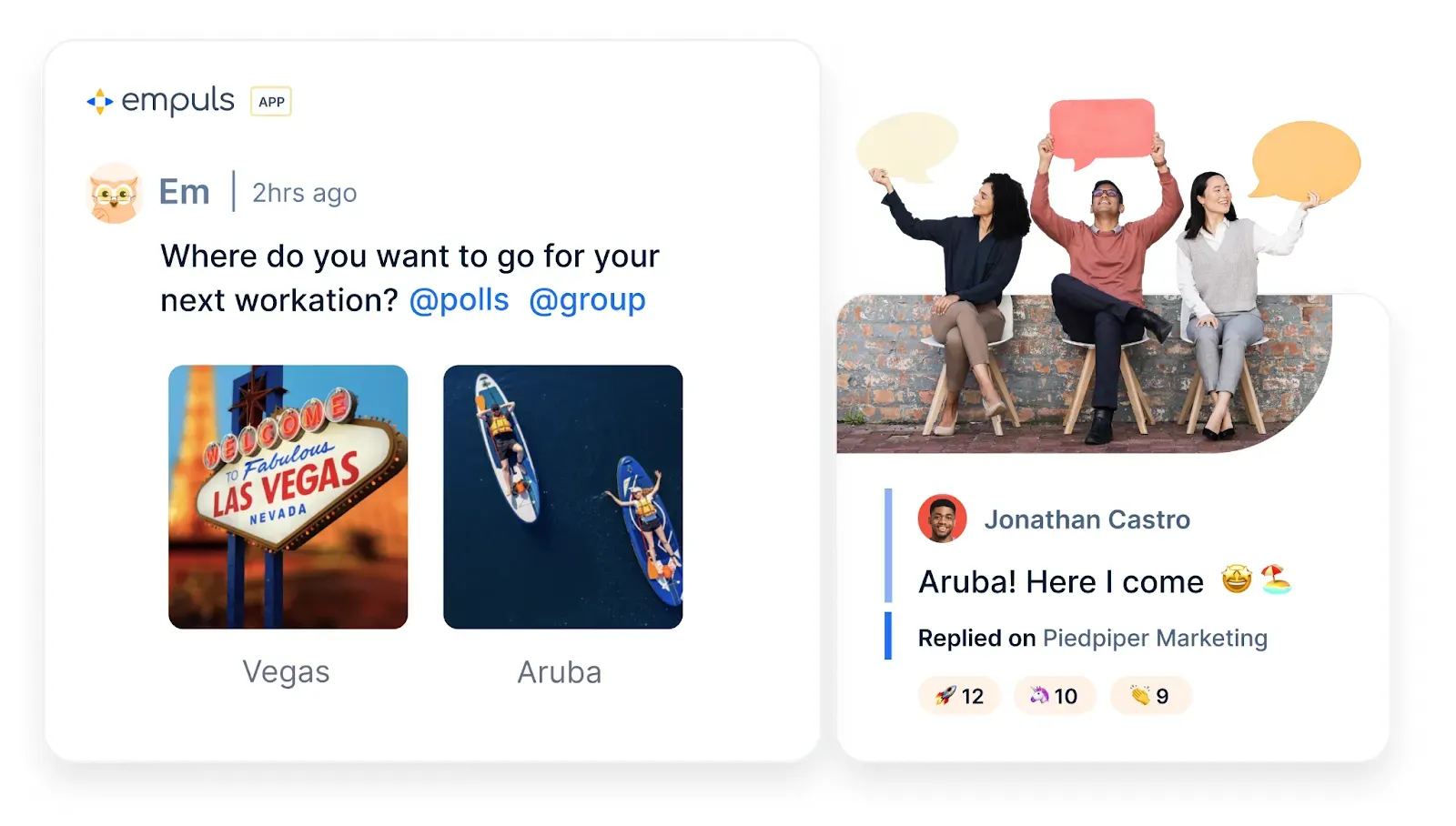
And most importantly, train managers to recognize and respect these different styles. When communication diversity is celebrated, introverts feel more confident contributing—knowing they don’t need to conform to be heard. It’s not just engaging introverts—it’s evolving your culture for everyone.
7. Design calmer workspaces
A loud, open office buzzing with constant conversations may energize extroverts but can quickly overwhelm introverts. To better engage introverts, consider how your physical (or virtual) workspaces are designed. Create zones or pods where employees can work in peace without interruptions—quiet rooms, soundproof booths, or simply dedicated “no-meeting hours.”
For remote workers, encourage personalized home-office setups that minimize noise and distractions. Providing introverts with control over their environment helps reduce cognitive fatigue and allows them to do their best work.
Even offering noise-canceling headphones or flexible seating options shows you're invested in their comfort. Respecting an introvert's need for solitude doesn’t mean isolating them—it means enabling them to recharge and focus in a space that supports their natural tendencies.
8. Give recognition through personalized messages
Public recognition has its place, but many introverts prefer more intimate, meaningful acknowledgments. Instead of applauding them in front of a crowd, send a sincere, detailed message via email, chat, or—better yet—through Empuls’ personal recognition assistant.
With Empuls, managers can use AI-powered nudges to get reminders when employees hit milestones or contribute behind the scenes. These prompts encourage timely, thoughtful notes that recognize effort and impact.
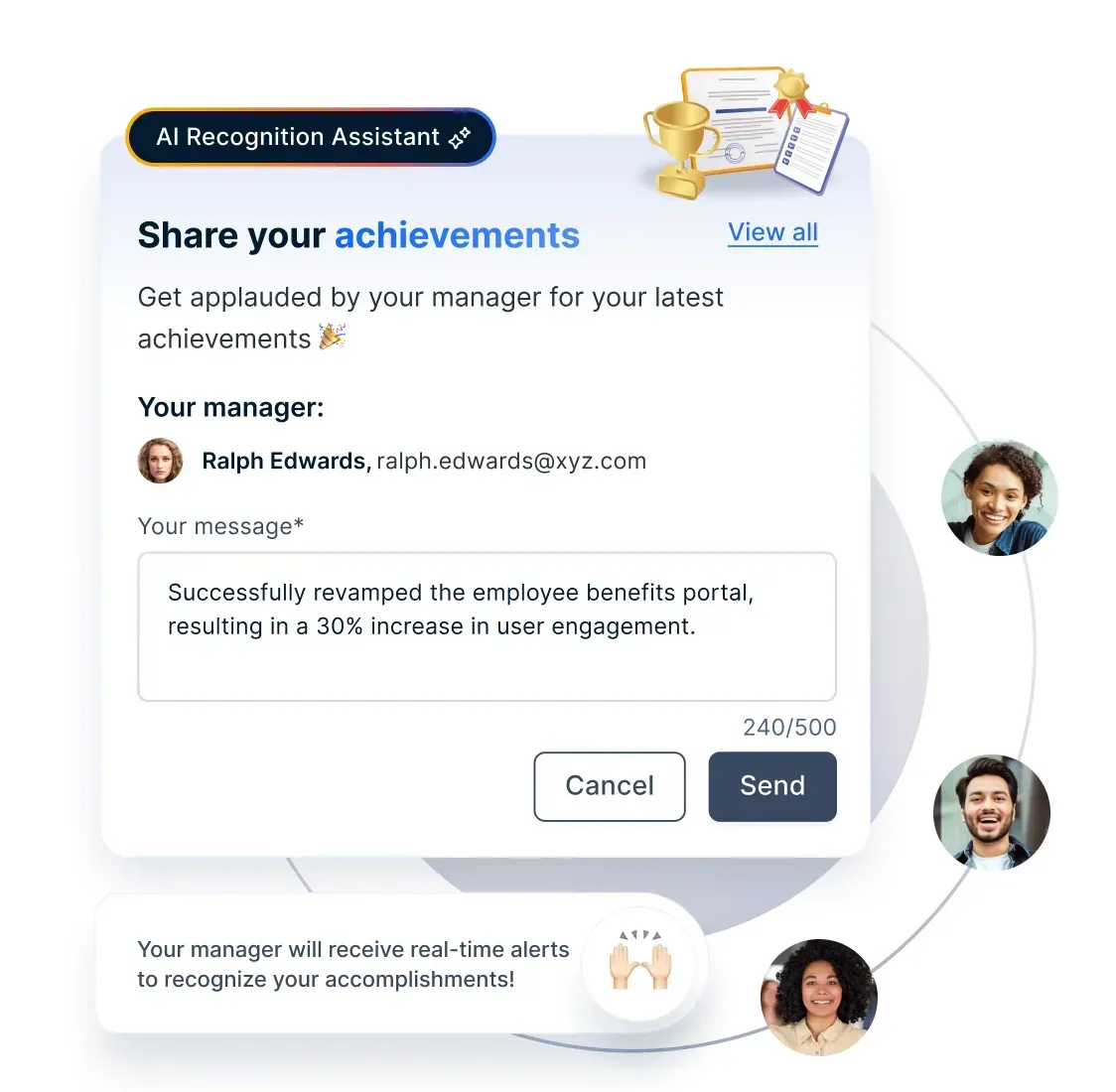
A private thank-you or a well-written note in the Empuls recognition feed can mean far more to an introvert than a loud team celebration. It’s the depth and authenticity of the gesture that matters. Plus, this approach ensures you never miss a moment worth appreciating, which builds trust and loyalty over time.
9. Avoid mandatory group socializing
For introverts, forced fun can feel like a chore. Happy hours, group lunches, or icebreaker activities that are mandatory can diminish their engagement. Instead of making social events a requirement, create a culture of opt-in connection.
Offer a range of social experiences—from large gatherings to smaller, more intimate coffee chats, book clubs, or even silent co-working sessions. Give employees the freedom to participate in what resonates with them.
Normalize boundaries by reassuring your team that stepping back from social events doesn’t reflect a lack of enthusiasm. Respecting these preferences supports psychological safety and ensures that introverts don’t feel excluded or “less engaged” simply because they socialize differently.
10. Use Empuls surveys for honest feedback
Introverts often have valuable feedback to share but may hesitate to voice it in meetings or town halls. To create a feedback-friendly culture, use anonymous surveys—especially those powered by tools like Empuls.
Empuls allows you to run pulse surveys, eNPS, and lifecycle surveys, giving introverts a safe space to express their thoughts without fear of judgment. These insights are often more honest, constructive, and nuanced—precisely what you need to improve workplace culture and employee experience.
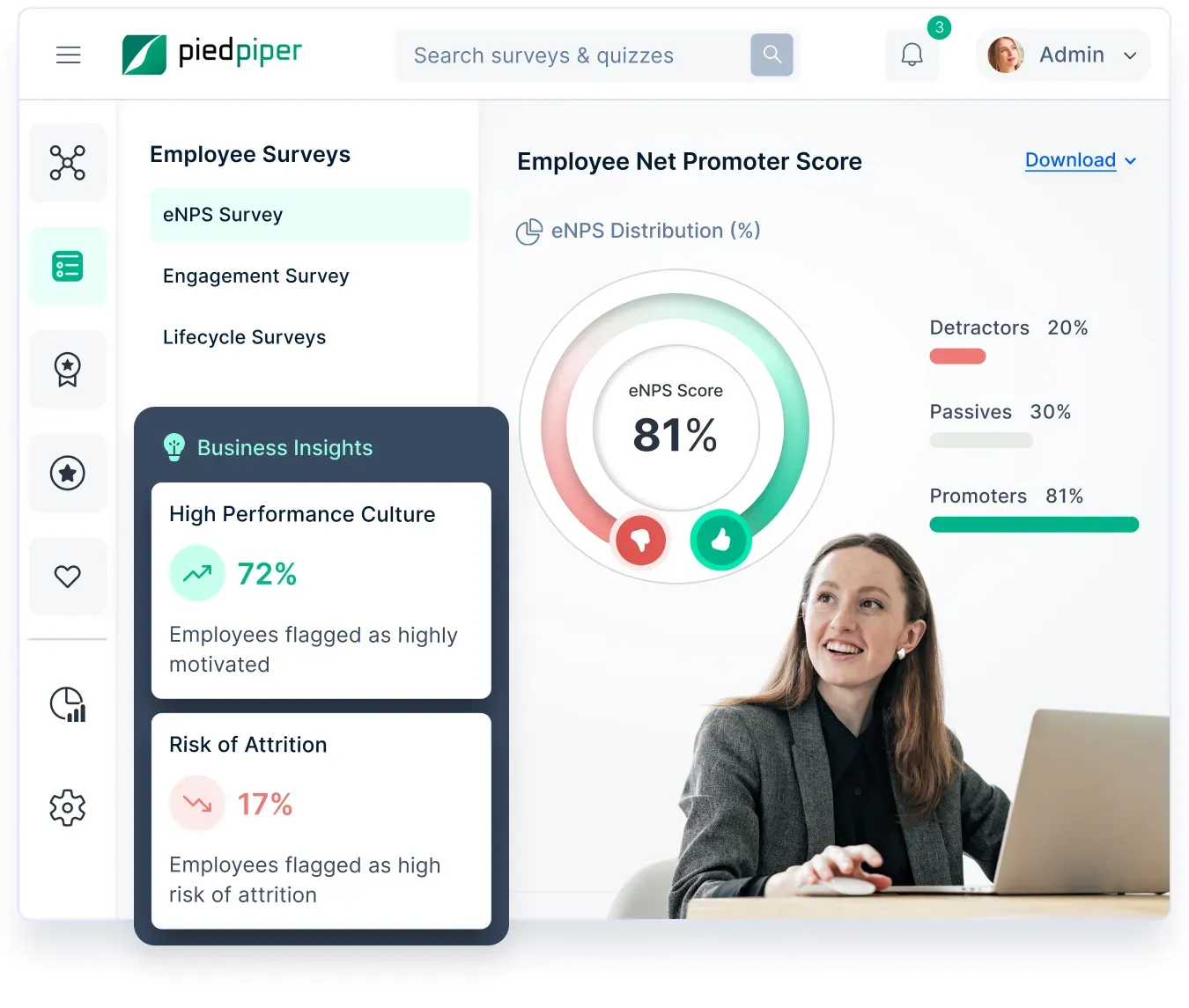
Plus, Empuls' built-in people analytics transforms survey responses into actionable insights for HR and leadership. By listening quietly, you're not just engaging introverts—you’re enabling continuous improvement backed by actual voices, many of which might otherwise go unheard.
11. Foster autonomy in work
Introverts flourish when they’re trusted with autonomy and ownership. Unlike extroverts who may seek ongoing collaboration, introverts often do their best work when they have uninterrupted time to think and execute. As a manager, give them the freedom to own projects from end to end, define their workflows, and make independent decisions wherever appropriate.
Avoid micromanaging or constant check-ins, which can create unnecessary pressure. Instead, agree on goals, timelines, and desired outcomes—and then give them the space to deliver.
Empowering introverts with this level of trust boosts their confidence, encourages creativity, and fosters deeper engagement. Over time, you'll see them delivering strong results and taking quiet pride in their work.
12. Promote flexible work schedules
Introverts often do their best work when they can manage their energy and environment. Offering flexible work schedules can be a game-changer for engaging introverts. Give employees the autonomy to start earlier or later, take midday recharge breaks, or work remotely on certain days.
Flexibility helps introverts optimize their focus and maintain a healthier work-life balance without the social drain of back-to-back meetings or high-energy office hours. This approach fosters trust, supports productivity, and demonstrates that you value outcomes over optics.
Whether it's a quiet time in the morning or solitude after lunch, honoring their rhythm helps introverts feel supported, not scrutinized—leading to deeper focus, higher job satisfaction, and stronger retention.
13. Encourage written appreciation among peers
Introverts may not always vocalize praise—but they sincerely value genuine appreciation from their peers. Encouraging a culture of written peer-to-peer recognition is one of the most potent ways to engage introverts, and Empuls makes it easy.
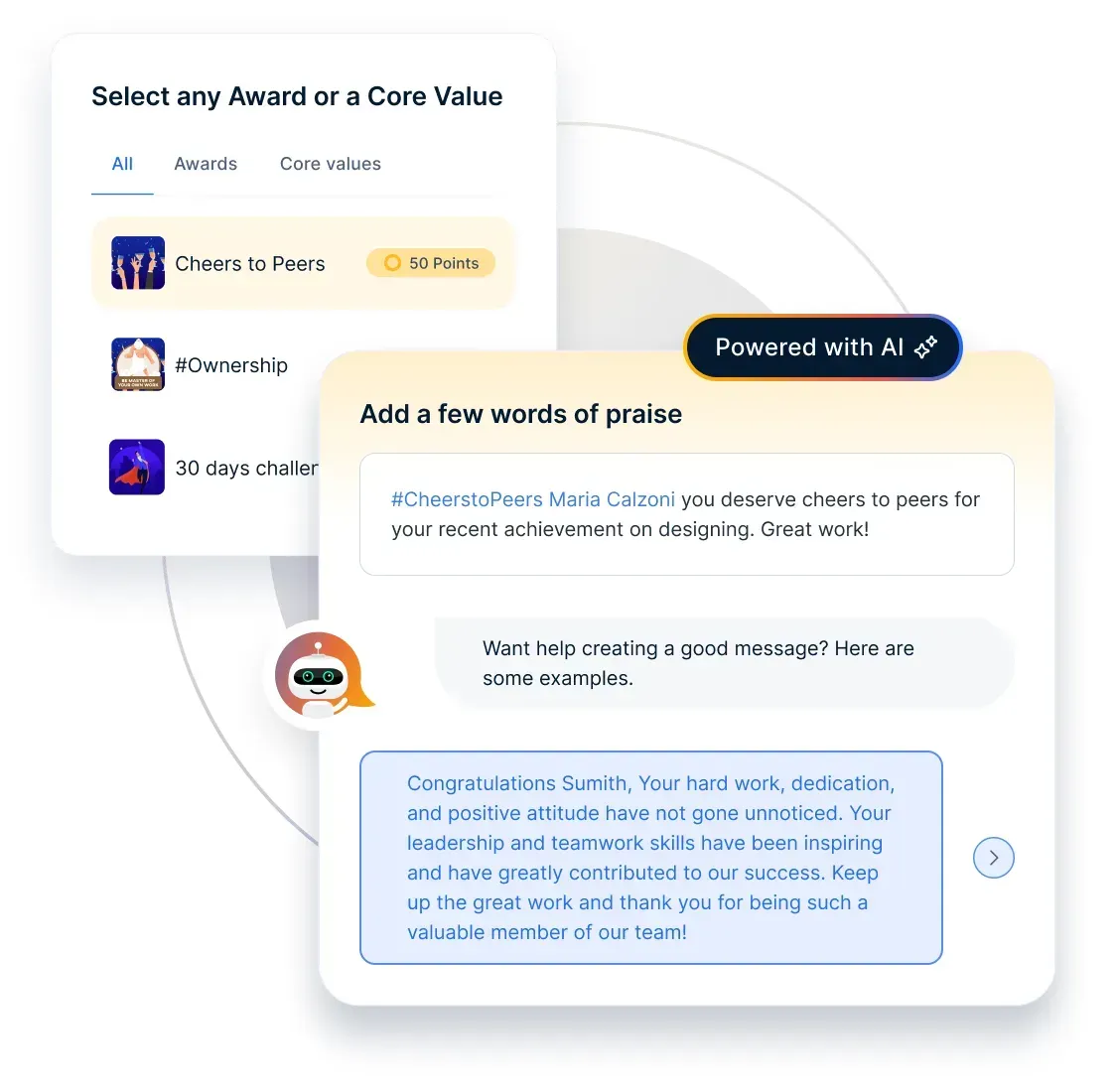
With Empuls’ peer recognition features, teammates can send personalized messages, badges, or digital kudos for contributions, big or small. This written format allows introverts to express gratitude comfortably while receiving acknowledgment in an authentic style.
It's not about flashy praise—it’s about reinforcing trust and camaraderie in a low-pressure format. Over time, this practice builds deeper connections and ensures introverts are part of a culture where appreciation flows in natural ways.
14. Offer opportunities for deep work
Introverts often thrive in environments that allow them to engage in deep, focused work without constant distractions. Unlike multitasking or constant collaboration, deep work requires uninterrupted time to think critically, solve problems, or create something meaningful. You can support this by minimizing unnecessary meetings, reducing workplace noise, and blocking time for focus on calendars.
Encourage team members to use “Do Not Disturb” settings and respect each other’s deep work zones. Leaders should model this behavior, too. When introverts know their time and space are protected, they feel trusted, and psychological safety drives higher-quality output.
Deep work is where many introverts shine brightest, so creating space for it is essential to unlock their full potential.
15. Match projects to strengths and passions
Not all engagement comes from social interaction—some of the most profound engagement comes from meaningful work. Introverts are often highly observant, analytical, and creative, making them excellent candidates for research, design, writing, data analysis, or long-form strategy work.
To truly engage them, take time to understand their strengths and passions. Use one-on-one check-ins or Empuls surveys to gather this input. Then, assign projects that align with those interests. Let introverts lead behind-the-scenes initiatives, develop knowledge hubs, or mentor others in a quiet way.
Matching work to strengths isn't just good management—it’s the best way to fuel motivation and unlock discretionary effort from employees who may not always seek the spotlight but always deliver value.
How Empuls helps you engage introverts at work
Engaging introverts in the workplace requires more than just open office plans and brainstorming meetings — it requires intentional, inclusive systems that give quieter voices room to thrive. This is precisely where Empuls makes a real difference.
Empuls provides a digital engagement platform that empowers introverted employees to participate in comfortable and meaningful ways.
With features like anonymous feedback surveys, one-on-one recognition, and asynchronous communication channels, introverts can express themselves without pressure to perform in large groups or high-energy environments.
Here’s how Empuls supports introvert-friendly engagement:
- 🧠 Asynchronous communication: Empuls’ social intranet allows introverts to contribute thoughts and ideas on their own time — without being overshadowed by louder voices in live meetings.
- 🗣️ Anonymous feedback: Through regular engagement and pulse surveys, introverts can share honest feedback without the anxiety of being put on the spot.
- 🌟 Personalized recognition: Introverts often prefer private or low-key appreciation. Empuls lets managers and peers recognize great work with customizable rewards and messages that suit individual preferences.
- 🧩 Culture of belonging: Empuls nurtures inclusion by aligning employees with company values and creating safe spaces where everyone — introvert or extrovert — feels heard and appreciated.
In a world that often celebrates the loudest voices, platforms like Empuls help ensure introverts don’t just get included—they get engaged.
Want to empower the quieter thinkers on your team? Discover how Empuls can help.
Conclusion
Engaging introverts isn't about changing who they are—it's about creating a workplace that values different ways of thinking, working, and communicating. By recognizing the strengths introverts bring to the table and tailoring your approach with empathy, structure, and flexibility, you create space for them to thrive.
Whether it's through quiet recognition, written feedback, or tools like Empuls that support asynchronous communication and personalized engagement, small shifts can make a big difference.
When introverts feel seen and supported, they don’t just participate—they contribute meaningfully, innovate deeply, and lead quietly but powerfully. It’s time to tune into the quieter voices—they often have the loudest impact.


















